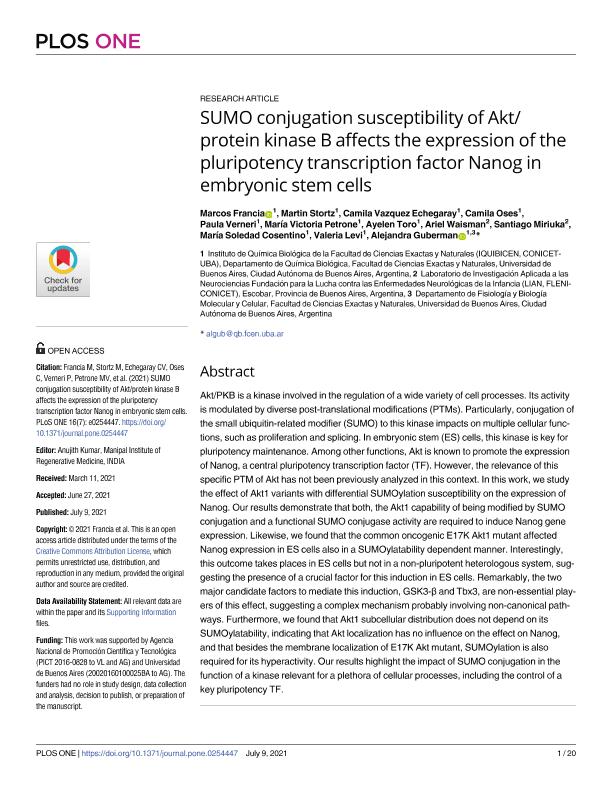Artículo
SUMO conjugation susceptibility of Akt/protein kinase B affects the expression of the pluripotency transcription factor Nanog in embryonic stem cells
Francia, Marcos Gabriel ; Stortz, Martin Dario
; Stortz, Martin Dario ; Vazquez Echegaray, Camila
; Vazquez Echegaray, Camila ; Oses Oliveto, Camila Maite
; Oses Oliveto, Camila Maite ; Verneri, Paula
; Verneri, Paula ; Petrone Parcero, María Victoria
; Petrone Parcero, María Victoria ; Toro, Ayelen Rayen
; Toro, Ayelen Rayen ; Waisman, Ariel
; Waisman, Ariel ; Miriuka, Santiago Gabriel
; Miriuka, Santiago Gabriel ; Cosentino, María Soledad
; Cosentino, María Soledad ; Levi, Valeria
; Levi, Valeria ; Guberman, Alejandra Sonia
; Guberman, Alejandra Sonia
 ; Stortz, Martin Dario
; Stortz, Martin Dario ; Vazquez Echegaray, Camila
; Vazquez Echegaray, Camila ; Oses Oliveto, Camila Maite
; Oses Oliveto, Camila Maite ; Verneri, Paula
; Verneri, Paula ; Petrone Parcero, María Victoria
; Petrone Parcero, María Victoria ; Toro, Ayelen Rayen
; Toro, Ayelen Rayen ; Waisman, Ariel
; Waisman, Ariel ; Miriuka, Santiago Gabriel
; Miriuka, Santiago Gabriel ; Cosentino, María Soledad
; Cosentino, María Soledad ; Levi, Valeria
; Levi, Valeria ; Guberman, Alejandra Sonia
; Guberman, Alejandra Sonia
Fecha de publicación:
07/2021
Editorial:
Public Library of Science
Revista:
Plos One
ISSN:
1932-6203
Idioma:
Inglés
Tipo de recurso:
Artículo publicado
Clasificación temática:
Resumen
Akt/PKB is a kinase involved in the regulation of a wide variety of cell processes. Its activity is modulated by diverse post-translational modifications (PTMs). Particularly, conjugation of the small ubiquitin-related modifier (SUMO) to this kinase impacts on multiple cellular functions, such as proliferation and splicing. In embryonic stem (ES) cells, this kinase is key for pluripotency maintenance. Among other functions, Akt is known to promote the expression of Nanog, a central pluripotency transcription factor (TF). However, the relevance of this specific PTM of Akt has not been previously analyzed in this context. In this work, we study the effect of Akt1 variants with differential SUMOylation susceptibility on the expression of Nanog. Our results demonstrate that both, the Akt1 capability of being modified by SUMO conjugation and a functional SUMO conjugase activity are required to induce Nanog gene expression. Likewise, we found that the common oncogenic E17K Akt1 mutant affected Nanog expression in ES cells also in a SUMOylatability dependent manner. Interestingly, this outcome takes places in ES cells but not in a non-pluripotent heterologous system, suggesting the presence of a crucial factor for this induction in ES cells. Remarkably, the two major candidate factors to mediate this induction, GSK3-β and Tbx3, are non-essential players of this effect, suggesting a complex mechanism probably involving non-canonical pathways. Furthermore, we found that Akt1 subcellular distribution does not depend on its SUMOylatability, indicating that Akt localization has no influence on the effect on Nanog, and that besides the membrane localization of E17K Akt mutant, SUMOylation is also required for its hyperactivity. Our results highlight the impact of SUMO conjugation in the function of a kinase relevant for a plethora of cellular processes, including the control of a key pluripotency TF.
Palabras clave:
Akt
,
sumo
,
transcription factor
,
Nanog
Archivos asociados
Licencia
Identificadores
Colecciones
Articulos (INEU)
Articulos de INSTITUTO DE NEUROCIENCIAS
Articulos de INSTITUTO DE NEUROCIENCIAS
Articulos(IQUIBICEN)
Articulos de INSTITUTO DE QUIMICA BIOLOGICA DE LA FACULTAD DE CS. EXACTAS Y NATURALES
Articulos de INSTITUTO DE QUIMICA BIOLOGICA DE LA FACULTAD DE CS. EXACTAS Y NATURALES
Citación
Francia, Marcos Gabriel; Stortz, Martin Dario; Vazquez Echegaray, Camila; Oses Oliveto, Camila Maite; Verneri, Paula; et al.; SUMO conjugation susceptibility of Akt/protein kinase B affects the expression of the pluripotency transcription factor Nanog in embryonic stem cells; Public Library of Science; Plos One; 16; 7-2021; 1-20
Compartir
Altmétricas



